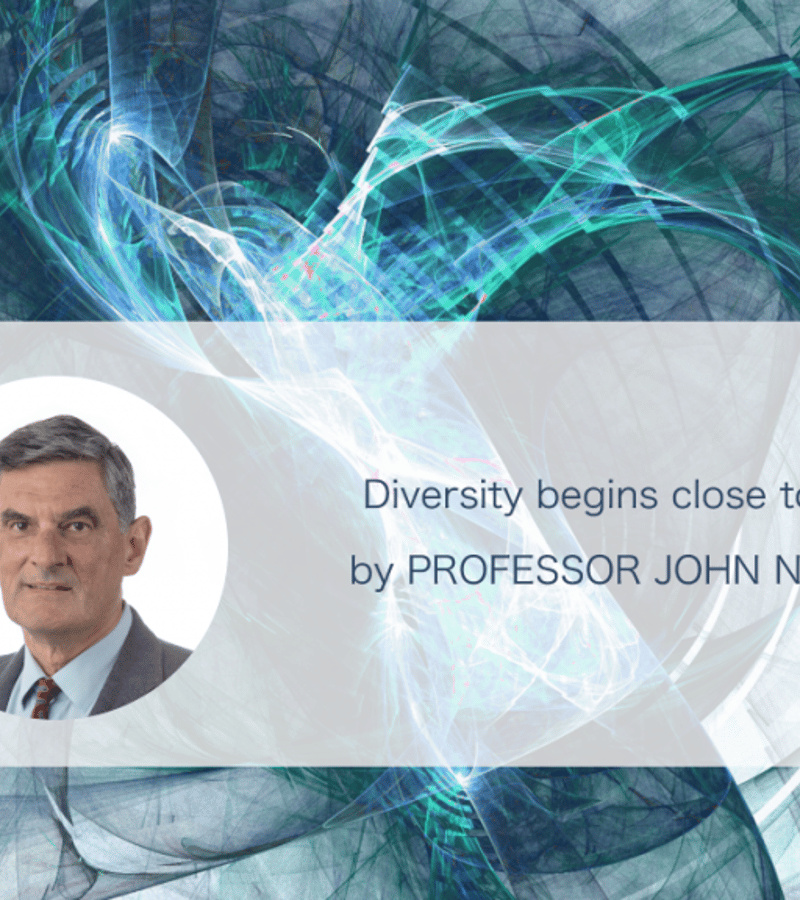
Professor John Newton
For years now our corporate training and consulting services have provided many tools and exercises for tackling interpersonal differences at work. Such methods, however, often fall far short of meeting tensions that derive from our ‘cultural self’ rather than our individual personalities. It is hard to grasp our cultural self because culture is not something we have; rather culture is something that has us. It is made up of all the messages we have internalised about ‘people like us’ that come to the fore when we encounter ‘people not like us’. Usually, we are not aware of internalising such cultural messages but they become so integral to our sense of identity that we get defensive when we need to collaborate with or depend on people who internalised different messages about the right way to be.
Lessons in the right way to be, start early as we are shaped by our gender, skin
colour, authority relations, family history, politics, economic circumstances,
spirituality, social grouping and schooling. Too often we react to the
appearance of these markers and do not take the time to explore received
cultural messages and the assumptions hidden within them. Instead, our emotional
reactions to cultural markers can provoke all sorts of defences against the
immediate experience of the ‘other’; defences such as stereotypes, fantasies,
irrational fears, overcompensation, denigration, idealisation, avoidance, envy
and mimicry. It is not enough to read descriptions of the other’s culture.
First, we have to understand our own cultural identity in order to accept our
own ‘otherness’, then to practice ways of mindfully negotiating our emotional
responses to the ‘other’ whilst being respectfully curious. It requires learning
from experience with others who wish to manage more productively the
inter-cultural dynamics that are increasingly part of our daily lives. Or as
Primo Levi put it, to achieve a state of mind where “….the differences in our
origins make
us rich in ‘exchangeable goods’, like two merchants who meet after coming from
remote and mutually unknown regions.”
I am pleased to recommend the following NIODA short course as a robust, educative and developmental way of exploring untapped riches in the cultural relations between us and them.

Professor Emeritus John Newton
September 2021
Diversity begins close to home

John Newton
Professor Emeritus, NIODA
From 2002-2008 John was Associate Professor of Organisation Dynamics, RMIT University and Director of the Masters in Organisation Dynamics. He was the founding director (1987) of the Master in Organisation Behaviour at the Swinburne University of Technology where he initiated the first Group Relations Conference for Australian postgraduate management students in 1988. This conference was offered annually introducing more than 500 managers to learning for leadership in the Tavistock tradition.
John is now a freelance consultant, part-time lecturer, action researcher and author who draws principally from the systems psychodynamic field. He is the lead editor of J.Newton, S. Long and B. Sievers (Eds.), 2006. Coaching In Depth. The Organisational Role Analysis Approach. Karnac: London and he has editorial responsibilities with the journals Socioanalysis and Organisational and Social Dynamics.
He is a member of ISPSO and a founding member and past-President of GRA.
Diversity training with a difference: Dr Brigid Nossal and Ms Helen McKelvie
AUD $2,000 for six live interactive online two-and-a-half-hour sessions
These sessions are fully interactive and online. The commitment is for six, two-and-a-half-hour sessions on Tuesday afternoons 3.30 – 6 pm (Melbourne time). The two and a half hours will involve short seminars, experiential learning activities, group discussion and reflection for integration of learning.
3.30 – 6 pm 🇨🇰 Melbourne
12.30 – 3 pm 🇸🇬 Singapore
10.00 am – 12.30 pm 🇮🇳 New Delhi
5.30 – 8 am 🇬🇧 London
6.30 – 9 am 🇧🇪 Brussels
12.30 – 3 am (eek!) 🇺🇸 New York
The time listed below is set to calculate the first start time depending on the time zone of your computer. The first session will start at:
time start
Related insights

Reflections on completing a Masters

Revelation, Not Salvation
Salvation is about being rescued from difficulty. It’s the quick fix, the ready-made model, the externally imposed solution. Revelation, on the other hand, is about discovery.

Australia a mind at home in the World?
2025 has been a tumultuous year that has built on a traumatic 2024 and a hyper turbulent 2020’s, in many ways, the world is still emerging from the shock of Covid-19 and associated exponential digitalisation of the social, political and economic context.
